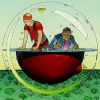
This has been a super-stressful week. We had a somewhat lighter than usual round of medical appointments this week, but it was more than made up for by home repair appointments.
We had the garage door installation scheduled for Tuesday, which ended up not being completed that day, so the technician would have to come back Wednesday. Then Tuesday night I discovered that the basement drain was backing up whenever we used the washing machine, dishwasher, or kitchen sink, so I called the plumbing company for that, but they weren't able to send a plumber out until Friday afternoon.
Then Wednesday night, right after the garage door technician left, L. discovered that the washing machine was leaking (totally not related to the basement drain backing up). I tried to fix it, but ended up making it worse. So I had A. call an appliance repair service, who said they could send someone over Thursday morning.
Thursday morning the appliance repair technician came and fixed the dishwasher. Then I had to take A. to get allergy shots, then we went to Ricky's house, where I shoveled the 7-8 inches of snow we'd gotten over the previous two days. (He doesn't drive, but I had to shovel a path from the street to his door so Meals on Wheels could deliver and also to shovel his back stairs to he could let his dogs out.) I'm still sore from this.
Today I had a National Heritage Responders meeting (which went very well), then I had to wait for the plumber to arrive and fix the basement drain. We had originally had a noon to 3PM window for him to show up, which got pushed back to a 2:30PM to 4:30PM window and he ended up showing up at about 3:45PM.
All the house things have been successfully fixed, and we're planning to enjoy this weekend's cold weather from inside the house as much as possible. (It's -2°F out right now, and supposed to go down from here, then only to get as high as 0°F tomorrow, and not to get into actual positive temperatures until Sunday.) But anyway, that's why I've got a massive mental backlog of posts I want to make, and why I've got a folder in my email of comments from you that I want to respond to, and so forth. I hope you're all doing well.
![[i]](https://www.dreamwidth.org/img/silk/identity/user.png) ysabetwordsmith: Science
ysabetwordsmith: Science

